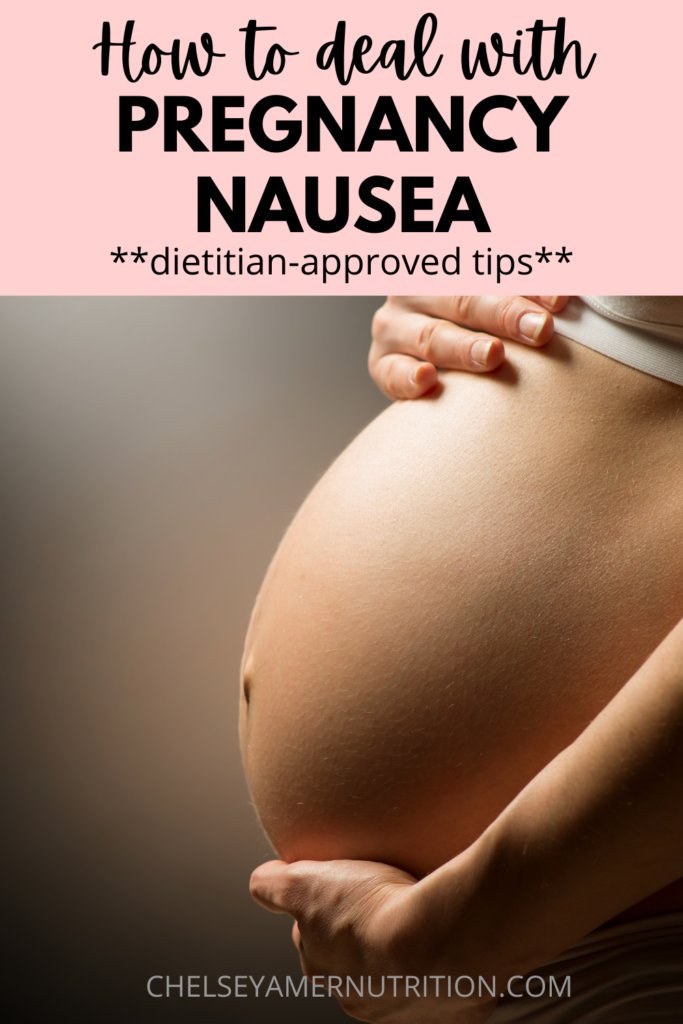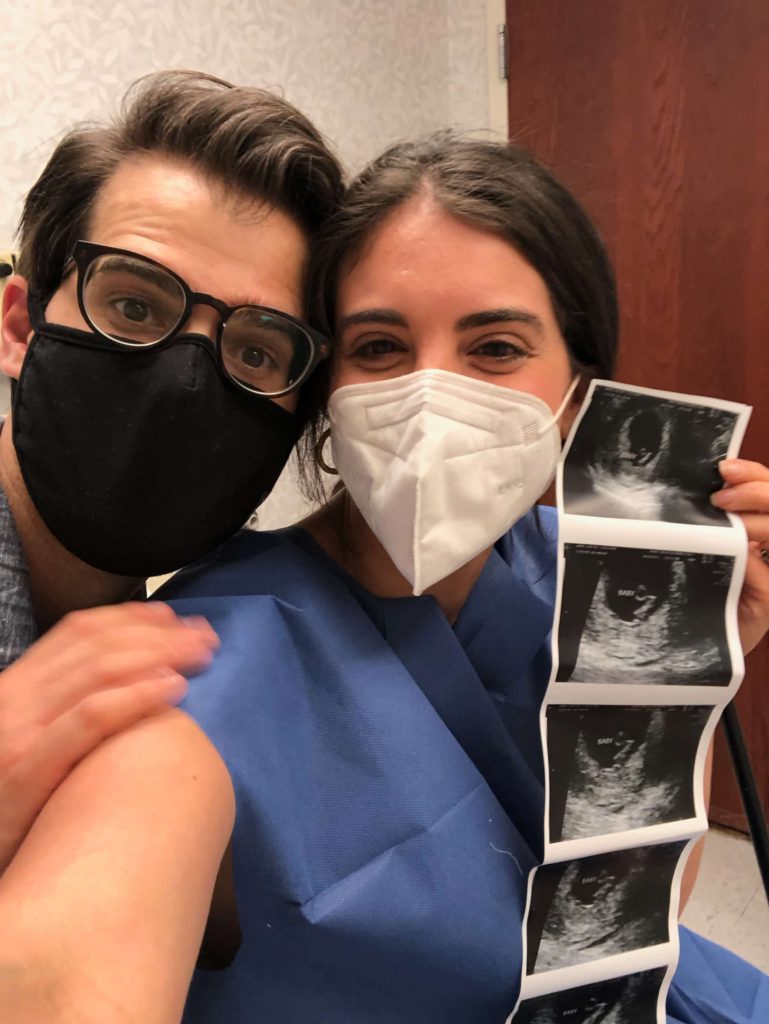How to Deal with Pregnancy Nausea + First Trimester Recap (Second Pregnancy Update)
First trimesters are often ridden with nausea (mine included!). Here’s how to deal with pregnancy nausea and a first trimester recap for my second pregnancy.

I will be sharing some snippets of my second pregnancy on the blog. I am not a prenatal dietitian, just sharing my personal experiences. I know pregnancy is a sensitive subject and these types of posts can be triggering for some people, so please take care of yourself first and foremost.
The first trimester is one of the most exciting, nauseating, and exhausting times of life. I remember one warm spring day early in my pregnancy (maybe 6 or 7 weeks?) when my parents came over to transplant some plants from their backyard to our backyard. Lex (my 2 year old) was napping and I just couldn’t stand up to pay attention to where they were transplanting hostas and lilies. It’s like I had to sit down and close my eyes and if I didn’t in that moment, I would have collapsed – from exhaustion alone.
And that’s pretty much how my entire first trimester went!
My 1st OB Appointment
Since we moved out to the suburbs since I gave birth to Lex, I decided I wanted to transfer my OB care. I wanted to deliver at a closer hospital. Although I never blogged about my birth story with Lex, I had the BEST care team and LOVED my OBs. I was really sad to be leaving, but my biggest fear when I was pregnant the first time was that I was going to give birth in a cab. I knew I’d have anxiety in the third trimester about giving birth in the car on the way to the hospital if I had to travel all the way to the city (which can easily be 90 minutes in rush hour traffic!).
At (what turned out to be) 7 weeks I had my first OB appointment. I knew I had long cycles and ovulated late so I couldn’t date my pregnancy based on the classic “first day of your last missed period,” so I was really curious how far along I was.
I guess you really do forget everything because I couldn’t believe at that first ultrasound how my itty bitty nugget already looked like a baby and had a strong heartbeat. It was magic all over again!

Symptoms in my 1st Trimester
Aside from the sheer exhaustion I mentioned earlier, I experienced several classic first trimester symptoms of pregnancy…
- Nausea
- Nausea
- And more nausea!
More on how to deal with pregnancy nausea below!
I’m pretty sure I was more nauseous this time around than last time. And I definitely never threw up last time, but it happened this time.
Between nausea, working, and taking care of a toddler, the exhaustion just compounded. I survived on bland carbs, resting, napping, barely working some weeks (the benefits of having my own business), going to bed right after Lex (yes, I got into bed at 7:30pm most nights), and relying on TV as a parent (which I really tried not to do pre-pregnancy!).
Some of my other early pregnancy symptoms were:
- Tender boobs
- Having to pee 24/7
- Food aversions (no veggies or chocolate, please and thank you!)
- Salty food cravings
How to Deal With Pregnancy Nausea
Pregnancy nausea is a beast. As someone who was once on a ton of IV antibiotics and got extremely nauseous, I found pregnancy nausea to be worse. Probably because most people don’t talk about being pregnant when they feel the worst. So there’s this component of secrecy that makes the nausea SO much harder to cope with.
My number one tip to deal with pregnancy nausea is to do everything in your power to get by.
I know that’s probably not too helpful, but it’s true. I always thought of my goal of the first trimester was to survive and get through my day-to-day life until the nausea subsided. I know not everyone is as lucky to have nausea totally subside throughout the rest of their pregnancy, and I truly feel for you. Nausea is a beast and no joke!
With that said, from a nutrition perspective there are a few things you can do to deal with pregnancy nausea.
1 . Enlist a good prenatal supplement
Your prenatal supplement will cover the gaps in your diet. Not only do you need your prenatal for the extra folate, iron and other nutrients, but it helps put less pressure on your diet, which is SO necessary in the first trimester.
But many prenatal vitamins are tough to take. Some are large, smelly, require multiple pills, etc. You have to figure out what works best for you. Personally, I’ve used New Chapter’s prenatal (not sponsored) since my first pregnancy. There are 3 pills daily, but I deal and they work for me. You can read more on my prenatal supplement routine from pregnancy #1 here.
2. Keep snacks at your bedside
I woke up nauseous in the middle of the night all of the time and in the morning, so snacks were essential. I loved pretzels and saltines in these cases. Even a small handful helped SO much!
3. Eat ahead of your hunger
You know I’m big on honoring your hunger, and it’s never more important than during pregnancy. But something that can really help prevent nausea during pregnancy is to avoid getting too hungry or over-hungry.
Whenever my stomach got completely empty my nausea was 10x worse and lasted 10x longer!
This brings me to my next tip…
4. Small frequent meals/snacks may be tolerated better
When you’re actually nauseous or experience nausea frequently, you may be better off eating smaller meals or more snack-like meals. For me that meant a lot of snack plates or toast.
Your protein needs increase during pregnancy (experts recommend 75 to 100 grams of protein per day), so try to add protein at *most* of your mini meals throughout the day.
Mini meals that can help deal with pregnancy nausea:
- Yogurt with granola
- Toast and eggs
- Baked potato and cheese
- Whole grain pasta and meatballs with sauce
- Lentil or chickpea pasta
- Chicken fingers
- Cottage cheese and fruit
5. Give yourself permission to eat all the carbs you need
In our diet-obsessed society carbs are the devil. However they’re your BFF during pregnancy. So let’s try to normalize carbs so you don’t feel so dang guilty for eating them when you’re nauseous during your first trimester!
Carbohydrates, like bread and crackers, tend to be well-tolerated because they’re bland. There’s something about meat and fish and veggies that just doesn’t sit right when you’re nauseous (most of the time).
When you can, opt for more nutritious whole grains over refined grains. HOWEVER, allow yourself to eat as many refined white carbs as needed.
Personally, I loved salty carbs so I ate a lot of saltines, tortilla chips, potato chips, and regular pasta with butter. When I could, however, I opted for whole wheat pasta or a whole grain tortilla.
Here are some of my favorite more nutritious carb swaps:
- Choose whole grain bread over white bread
- Choose whole wheat or even lentil/chickpea pasta over white pasta
- Toast whole grain tortillas to make chips
- Whole wheat freezer waffles
- Pair your carb with a protein to help boost your protein intake (like chicken tenders or cheese melted on bread)
6. Stay hydrated
At one point early in my pregnancy I was craving orange juice and lemonade. My first trimester was mostly over summer months of late May, June through July, so perhaps I was just so hot, but I considered this a sign from my body to stay hydrated.
Especially when you’re nauseous, staying hydrated is essential!
Diet culture often tells us not to drink juice or sugary drinks. And yes, for our health we should minimize these beverages because most people don’t feel too good drinking sugary drinks on the daily.
However, when your pregnant, fluids are necessary and you may feel worse from under-hydrating than if you were to drink what sounds good to you. If it’s really hard for you to get down water, it’s OK for you to add some flavor. I often would have just a couple of sips of something acidic to help my nausea and give myself a boost of energy.
Add a squeeze of lemon, lime, or orange to your water or infuse any other flavor that sounds good. Then, if you occasionally want to drink something else, I say go for it. If you’re concerned about any underlying diabetes or gestational diabetes in a previous pregnancy, check with your dietitian/OB.
7. Give yourself grace
You’re pregnant and nausea is often part of the game because of your raging hormones. Be gentle with yourself and your nutrition. You’ll get there in the second and third trimester when it’s more important.
One of the reasons I love working with young women is because many express interest in wanting a family in the future. Improving your relationship with food now can drastically help ease food fears and food rules that may make your pregnancy diet (of carbs, carbs, and more carbs) more bearable.
If you’re interested in improving your relationship with food, sign up for the waitlist for the Nutrition Training Program.
XO


 Hi there!
Thanks for stopping by! I'm Chelsey, an online Registered Dietitian, recipe developer, budding photographer, and coffee addict! My mission is to help you feel good through food by answering the question "What should I eat?" Let's make nutrition approachable!
I hope you enjoy my personal collection of simple, healthy, food allergy friendly and nutritiously delicious recipes, plus tips and tons of tricks that will help YOU live a nutritionally-balanced life! I look forward to getting to know you better...
Hi there!
Thanks for stopping by! I'm Chelsey, an online Registered Dietitian, recipe developer, budding photographer, and coffee addict! My mission is to help you feel good through food by answering the question "What should I eat?" Let's make nutrition approachable!
I hope you enjoy my personal collection of simple, healthy, food allergy friendly and nutritiously delicious recipes, plus tips and tons of tricks that will help YOU live a nutritionally-balanced life! I look forward to getting to know you better...







